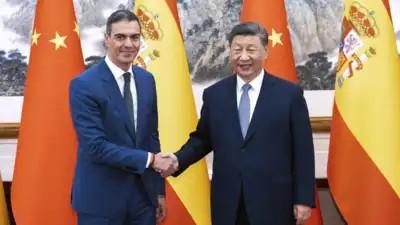
What signals does Spanish Prime Minister’s visit to China send?
Global Times
President Xi Jinping met with visiting Spanish Prime Minister Pedro Sanchez in Beijing on Friday. This marks Sanchez’s third visit to China within three years, highlighting Madrid’s emphasis to deepening China-Spain relations and representing the continuation of the friendly policies toward China from many European countries. Sources from the Spanish government revealed that Sanchez’s visit was supported by the European Commission. At a time when unilateralism and protectionism cast a shadow over the world, this visit carries greater significance, sending a positive and clear message: China, Spain, and other European countries are adopting a pragmatic approach to cooperation, safeguarding the consensus on economic globalization, and injecting stability into the world economy.
This year marks the 20th anniversary of the establishment of a comprehensive strategic partnership between China and Spain, as well as the 50th anniversary of diplomatic ties between China and the EU. During the meeting, Xi emphasized that as the international situation gets more complex and volatile, it is increasingly important for China and Spain to develop sound and stable relations. Xi pointed out that China always sees in the EU an important pole in a multipolar world. China is a major country that explicitly supports the unity, development, and growth of the EU.
President Xi further stated that China and the EU should step up to their international responsibilities, jointly safeguard economic globalization and the international trade environment, and jointly reject unilateral and bullying actions. China and the EU should defend not only their own legitimate rights and interests but also international fairness and justice and international rules and order.
Sanchez responded positively, expressing that the EU is committed to open and free trade, upholds multilateralism, and opposes unilateral tariff impositions.
For a long time, the political landscape within the EU has been complex and diverse. Amid the persistent noise of so-called “de-risking” from China, the mutually beneficial and win-win cooperation between China and Spain has served as an example for China-EU relations.
In recent years, Spanish agricultural products have increasingly gained favor among Chinese consumers, while China’s strengths in new energy technologies and manufacturing have injected new momentum into the Spanish economy. The Mobile World Congress in Barcelona has even become a “shining showcase” of China’s new quality productive forces in Europe.
People have noticed that on April 9, after the US Treasury Secretary Scott Bessent threatened Spain by saying that getting closer to China would be like “cutting its own throat,” Luis Planas, Spain’s Minister of Agriculture and Fisheries, Food and Environment, countered, stating that the country intends to “not only continue having” excellent trade relations with China, but also “expanding” the relation. In the shared endeavor to fight against unfair tariff barriers and uphold multilateralism and economic globalization, China and Spain have become partners on the same path.
Sanchez’s visit has pressed the “accelerator” on deepening China-EU cooperation. On April 8, China’s Commerce Minister Wang Wentao and European Commissioner for Trade and Economic Security Maros Sefcovic held a talk via video and reached a consensus that “the two sides agreed to immediately start negotiations.” Foreign media reported that China and the EU have agreed to look into setting minimum prices of Chinese-made electric vehicles instead of tariffs imposed by the EU last year.
Behind this breakthrough lies a deep mutual understanding that “there are no winners in a trade war.”
It not only helps China and the EU effectively avoid an escalation of trade tensions, preserving market space for automakers and other enterprises along the production and supply chains, but also offers a real example of how negotiation and cooperation can resolve trade disputes and mitigate conflict between nations with sincerity and mutual respect.
The EU, like China, is a staunch supporter of economic globalization and free trade. China and the EU account for over one-third of the world’s total economic output, having formed a close economic symbiotic relationship. Various signs indicate that recently, Brussels has shown a more constructive attitude toward developing relations with China. This shift is driven not only by economic interests but also by a pursuit of strategic autonomy.
At the 2025 China Development Forum, European companies made up about 40 percent of the total attendees. European business executives “voted with their feet” by coming to China, expressing optimism about China, and increasing their investments there. This has rendered many deliberately politicized and weaponized trade issues ineffective. The vitality of China-EU relations is also attributed to the fact that it is not an “exclusive game,” but rather an “open and win-win” situation that does not target, depend on, or be constrained by any third party.
China and EU have a high degree of alignment in their shared opposition to trade protectionism and commitment to multilateralism. Their cooperation in areas such as trade, global governance, and climate change demonstrates strong resilience.
The positive signals conveyed by Sanchez’s visit to China call for more like-minded individuals to join in supporting multilateralism and open cooperation.
We look forward to a stronger resonance within Europe as well as the international community from the joint message of China and Spain, advocating for dialogue rather than confrontation, openness rather than closure, and rules rather than power.
